ACTIVE vs. PASSIVE
REAL ESTATE INVESTMENT
TRANSCRIPT:
(00:00):
You probably heard the terms active and passive. Real estate investor. I'm going to break that down for you, an active Real Estate Investors much like it sounds, you are doing all the activity associated with investing in that piece of real estate, whatever that real estate might be. So, this means you're going to Source the deal, which usually means having to go build relationships with real estate agents.
(00:31):
Or real estate brokers. So, you can get the good deals. You're going to have to then analyze. Those deals know how to tell a good deal from a bad deal and do all the due diligence involved in. So doing, you can need to negotiate the contract, make sure it is favorable to you and all the terms of the buying, then you're going to have to go find a lender to lend you money on it. Why that's a big Bank, a little Community Bank Credit Union or private money? However, you're going to fund it, you'll have to do that.
(01:01):
Then you have to sign for that loan. Usually, in those cases, it's are course loan, unless it's a really large property which means that if you default on that loan, they're coming after you, sorry, that's the bad news. Then you have to manage that property so you're going to manage that property for next 3 5 10 years. However, long you decide to hold it or you're going to hire a property manager to do that for you and then you have to manage your property manager and then you decide if you're going to refinance it at some point if you're going
(01:31):
Sell it and you make all those decisions and you do everything you need to do in order to get it listed sold all that concept. So that is a active real estate investor. Now pass a real estate, investor is more passive as it sounds. So, this usually means that you're going to partner with somebody who has a lot of experience doing that. So, they already know how to Source the deal, how to negotiate them, how to get you the best terms, and then they would be the ones signing on the loan.
(02:01):
The passive investors generally don't have to sign for the loan. They have no personal responsibility for that loan. So, but you are still an owner in the property, so you still get all the same benefits of ownership when it comes to tax, depreciation, tax, write-offs, it's still considered passive income in both cases. So, from a tax standpoint, it's not active earned income, which is, you know, at the higher income rates considered passive income just as
(02:31):
If you were investing in the stock market or something to that effect, so you get all the benefits of ownership, you get the cash flow, you get, refinance proceeds, you get sales proceeds, all of that. But because you are passive, you're usually in what's called a limited partnership, you're just bring the money. There are General Partners. Those are the people whose Source the deals and manage the deals. They will make the day to day-to-day decision. So, they will hire the property manager. You don't get a say in who that
(03:01):
Is they decide when you're going to refinance or sell the property, all those decisions are made in the general partnership. The good news is that they can usually go after larger deals because they usually bring in multiple partners generally in the form of a syndication. And all the syndication is a group of investors that pool their money to go buy something that's the long and short of it but usually means that you get the benefits of scale because you get to buy something bigger and so that often means that
(03:31):
It's more profitable even though you are sharing ownership with several other people but because it's managed at a larger scale and with professionals who know what they're doing, often times, you make as much if not more as a passive investor as you do an active investor. And again, you don't have that personal liability for the loan, you get all the tax benefits to cash flow, all that kind of stuff. So those are the main differences between passive and active investor. And if you want to learn more, or just hit me up, I’m happy to answer all your questions.

